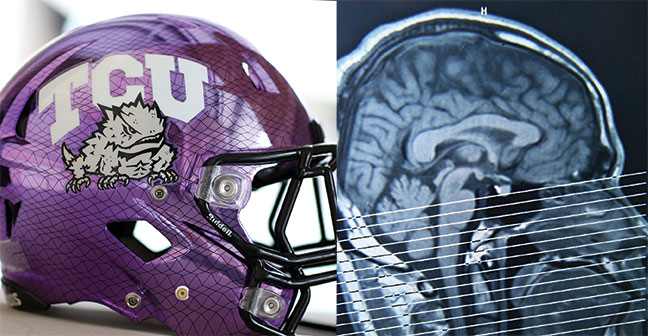Concussion Management and College Football
Could fish oil alleviate the effects of head trauma? TCU researchers work with the football program to investigate the neurological protections of omega-3 fatty acids.

Kinesiology professor Jonathan Oliver teamed with the TCU football program to advance head trauma research.
Concussion Management and College Football
Could fish oil alleviate the effects of head trauma? TCU researchers work with the football program to investigate the neurological protections of omega-3 fatty acids.
Long after the Horned Frogs trounced Ole Miss in the Peach Bowl, the legacy of that storied season continued with groundbreaking research into head trauma. In fact, key findings involving the 2014 Big 12 championship team may have wide-ranging health implications for anyone who participates in contact sports.
Jonathan Oliver, assistant professor of kinesiology, started with a simple premise: Football players sustain head impacts throughout the season, the vast majority of which aren’t serious enough to be labeled concussions. Since athletes often return to practice or play before a full recovery from concussions, the professor wondered if that put the athletes at risk for more serious damage. And if so, what could be done?
“One of the great things about fish oil, which is the most common source of omega-3, is that there are almost no side effects even at high doses, and it’s very good for your heart.”
Dr. Michelle Kirk, TCU team physician
Oliver isn’t alone in asking questions concerning head trauma on and off the gridiron. The deteriorating health of some former professional football players, along with post-mortem diagnoses of CTE, has sparked a nationwide conversation about long-term neurological implications.
In the study’s findings, which are slated for publication in the Journal of Neurotrauma and in Medicine & Science in Sports & Exercise, Oliver took a closer look at docosahexaenoic acid (DHA), the most abundant omega-3 fatty acid in the brain.
“DHA has received considerable attention as a possible intervention to mitigate pathology associated with concussion, but only in animals,” said Oliver, who is also a lifelong athlete. “We sought to determine if DHA would provide a neuro-protective effect over the course of the season in these football athletes.”
Can DHA, the body’s most abundant fatty acid, protect the brains of football athletes?
In other words, could DHA not only speed healing in players but also help prevent injuries in the first place? To investigate his research theories, Oliver recruited Dr. Michele Kirk, TCU’s team physician, and David Gable, assistant athletic director of sports medicine.
“When Jonathan came to me, he didn’t know I’d already been prescribing omega-3s for years to my patient-athletes,” said Kirk, director of the sports medicine fellowship program at John Peter Smith Hospital in Fort Worth, who also maintains a private practice in sports medicine. “One of the great things about fish oil, which is the most common source of omega-3, is that there are almost no side effects even at high doses, and it’s very good for your heart.” (Although fish oil is associated commonly with omega-3s, fish actually obtain their omega-3 from a diet rich in algae, the source used in this study.)

David Gable, Dr. Michelle Kirk and Jonathan Oliver teamed up for the TCU concussion study. (Photo by Carolyn Cruz).
Oliver, Kirk and Gable designed a study that started during the TCU football team’s summer conditioning (57 days), continued through fall camp (23 days) and culminated during the season, which spanned 109 days. During this time frame, research assistants from TCU’s kinesiology program gave players a daily dose in liquid form of the DHA supplement manufactured by DSM Nutritional Products. (Beyond providing the algae-derived DHA, the Dutch company donated $100,000 for the research study. Other financial support came from the Harris College of Nursing & Health Sciences, the TCU Provost’s Office and several universities in the U.S. and Europe.)
“If you go to the drugstore and buy fish oil capsules you have to be careful about the dosing because you may only be getting 300-400 mg of the actual fish oil even if you’re taking a 1,000-mg capsule,” said Gable. “The only problem with the liquid form was it didn’t taste very good. Jonathan went back and worked on the formula to make it easier for the players to tolerate.”
In spite of initial objections to the flavor, the investigators said the players were fully invested in the research. “We sat down with them beforehand and explained they would not just need to take daily doses of the DHA over an extended period, but that we would have to do timed blood draws, too,” said Oliver.
“[Football Coach Gary Patterson] and the players had a sense that what we might learn with their help could have the potential to impact future athletes,” said Oliver. Indeed, the study’s results shed light on how to detect, combat and possibly prevent head trauma.
Omega-3s, including fish oil, may help athletes manage the effects of concussions
Many of the players seemed convinced the supplement helped speed their recovery from injuries. In fact, several of them requested the supplement after the trials ended. “It’s not like drinking a Red Bull where you feel more energy right away,” said Gable. “But the players understood that it was all about what’s happening in the body to help protect them if they get hurt.”
The study revealed that neurofilament light or NFL acted as a protective. Oliver explained that neurofilaments are major components of the axon, which makes up part of a nerve cell. For years, researchers linked neurofilaments (particularly NFL) found in cerebrospinal fluid and blood with Alzheimer’s disease, ALS or Lou Gehrig’s disease and other neurological disorders.
When it comes to NFL, Oliver said, “we do not want to see a sharp increase above someone’s normal levels, which would suggest some type of damage.”
The study showed that the players’ NFL levels climbed throughout the season, even though they did not reach levels high enough to indicate a concussion. Starting-line players who saw the most action on the field experienced the most overall increases. Another study had athletes take various daily doses of DHA. Those players on higher doses showed smaller increases in their NFL levels.
“I think we were all a little surprised to see the neurofilament increasing throughout the season in all players,” said Kirk. “What was especially interesting was to learn that repetitive hits to the head—even when they’re not severe enough to cause a diagnosed concussion—could be causing damage.”
The study pinpointed a measurable biomarker—the NFL—as a way to diagnose concussions and lesser head traumas, Oliver, Kirk and Gable plan to expand their research beyond the football season to see whether the players’ NFL levels return to normal when they aren’t training or playing.
“The thing about concussions is there’s so much we still don’t know,” said Gable. “If there is a way to make it safer on the field for our players we absolutely want to do that. And we want to look at other sports too. What about the kid who gets an elbow to the head on the basketball court?”
Oliver, Kirk and Gable emphasize that their research work isn’t about changing a beloved sport. “We like football. All we want to do is make football safer for our athletes,” said Kirk. “Omega-3s may be one way to do that. And having a biomarker like NFL may change the way we diagnose and treat head injuries in the future.”

Your comments are welcome
1 Comment
Good morning, & Happy New Year.
Great win last night.
Has anyone ever considered padding the outside of a helmet, just enough to reduce the noise of the impact. Today’s helmets are so well designed and manufactured, focusing on the inside padding. I believe that the loud noise made when to helmets collide increases the chance of concussion. Just a thin layer, that would not take away from the esthetics. Just a Thought.
Related reading:
Campus News: Alma Matters, Research + Discovery
Should You Send Work Email After Hours?
Consider the possible emotional response first, says management scholar Bill Becker.
Campus News: Alma Matters
The Neurobiology of Aging
Science Professors Join Forces to Fight Alzheimer’s Disease.